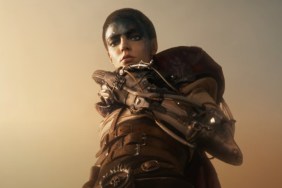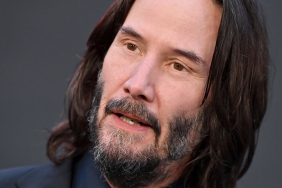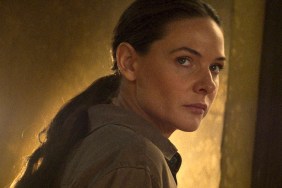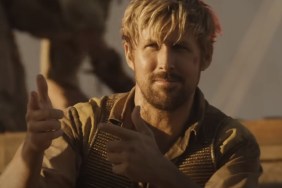Family comedies can be a dime a dozen, especially in the world of independent film, but as a follow-up up to her critically-acclaimed 2009 festival fave Humpday, filmmaker Lynn Shelton decided to explore whether blood was indeed thicker than water in Your Sister’s Sister.
It once again stars Mark Duplass, this time playing Jack, who a year after his brother’s death has yet to get over it, so his closest friend Iris (Emily Blunt), who also happens to be his brother’s ex, convinces him to spend some time at her family’s summer home on a remote island. There, Jack has a drunken encounter with Iris’ lesbian sister Hannah (Rosemarie DeWitt) – one drink leads to another and they have a one-night stand. And then Iris shows up.
We can’t say too much more about what happens but it’s as hilarious and thought-provoking as anything in Humpday. It’s actually been quite a long road for Your Sister’s Sister since it premiered at the Toronto Film Festival last September as it’s played at virtually every single film festival since then, including Sundance, Seattle, Tribeca and many more.
A few years back, ComingSoon.net interviewed Lynn and her cast of Humpday and we decided to take a similar approach with this one, sitting down with Shelton (far left), actresses Emily Blunt (far right) and Rosemarie DeWitt (center) when they were in New York City for the film’s Tribeca Film Festival premiere. The three ladies talked at length about Lynn’s process of working which involves developing the characters enough that there isn’t a fully-written script before they start filming. (Also, look for our separate phone interview with Mark Duplass talking about reuniting with Lynn and some of his other projects, like Safety Not Guaranteed, later this week.)
We began with Shelton herself for a few minutes before being joined by the others.
ComingSoon.net: I remember we spoke for “Humpday” and if I remember right, you did a lot of rehearsals with the actors beforehand to come up with their characters. Is that right?
Lynn Shelton: Not rehearsals, but just talking about creating backstory and telling a lot of personal stories and second-hand stories and just drawing from our own lives to kind of inform these characters and figure out who they are, and that always bleeds over into the plot, so if there’s something that I have that’s not working out, I want it all to be believable so sometimes it’s like, “Well I have this thing that I need to happen in the plot. How do we make that believable?” and we’ll go back and find something in the backstory that would make it believable. It sort of goes in both directions.
CS: So in the case of this one, you met up with Mark and Emily and Rosemarie and just talked over their characters?
Shelton: Yeah, Mark called with the initial kernel of the idea, sort of the launching point – two best friends, a girl and a guy, the guy’s having a hard time because he’s just lost his brother recently and she sends him up to her family’s place. In his version, it was supposed to be the mother, like a hot younger mother, and that was the launching point and then everything else came out of that. I switched it from mother to sister and then everything else that happens in the film emerged after that, but I wanted to bring the actors in early on in the process, so that they could be really intensely collaborative in figuring out all those details of who are these people and what’s the backstory? But then we lost the original actress that Rose played, so Rose actually came in to save the film like three days before the shoot began, like literally at the last minute and was able to make use of all that work, because it was a bible. We’d done all that work but her challenge then was to dive in headfirst into this process that had already been underway, and to bring herself to it.
(At this point, we’re joined by Emily and Rosemarie.)
CS: I’ve spoken to Lynn before for “Humpday” as well as Mark and Josh (Leonard), but what was the draw for you to do this, Emily? Did you already know about “Humpday” and knew anything about Lynn’s process?
Emily Blunt: Yeah, my agent called me, he said, “Lynn Shelton wants to call you,” and I said, “Humpday Lynn Shelton?” and I was a big fan of the movie and I could see watching it that it must have been an improvised style because it had the awkward messiness of life captured on screen. I loved that, and that was a huge appeal for me at that time. I felt like I was really wanting to escape the glow of some of these scripted Hollywood movies, so Lynn called me and I was kind of strolling around outside as she was talking to me. It was a very instant “yes” for me. We spoke and I said “Yeah,” and we spent 20 minutes, half an hour, on the phone. My first movie I did was all improvised and I had been really craving to work like that again and also daunted by it, because I found the process very challenging, but exhilarating, because the moments you can capture working in that style are so golden, and you’d never be able to get them with regular scripted dialogue, the spontaneity of it all. It was an easy “yes” for me, very much.

CS: I know Lynn spends a lot of time developing the characters
Blunt: Mm-hm. We’d all just get on the phone, maybe five times, and then we met one weekend.
Shelton: Over the course of eight months maybe?
Blunt: Yeah.
Shelton: It’s very non-labor intensive at all and there was a weekend where we got together.
Blunt: And it was really more sharing, it was sharing ideas and…
Shelton: Throwing stuff against the wall and paring down.
Blunt: And you were great in listening. Did you record those phone calls or did you just write down what we were talking about?
Shelton: No, I’d usually have my laptop so I’d be keeping notes.
Blunt: But she’s like the queen of editing and paring down and really getting to the heart of things, and she has great integrity when it comes to what’s valuable and what you buy. The premise is kind of out there and “Humpday” was even more out there, but trying to find the human heart of it all is what’s she’s so brilliant at it, so we all felt pretty safe in those conversations to just throw anything out there and see what Lynn thought would work.
CS: When you came on three days before, had she written up anything that you could work from?
Rosemarie DeWitt: Well, no. I knew I wanted to do it because I was a great fan of “Humpday” and also of Mark and Emily. I knew it was exciting because I was very inspired by the naturalism of “Humpday” and the reality and the humanity and the performances. I said that I wanted to do it, but I was on a TV show and we were shooting in L.A. and I was like, “Unless you shoot right next door to this TV show all I can do is two days a week. I don’t think I can do it.” And the producers on the show were lovely and they made it work along with Steven Scharf our producer, and everyone just kind of worked together, but I kind of agreed to do it, and then Sunday night, you sent me
Shelton: Yeah, the scriptment.
DeWitt: And you know what? I think it was just too overwhelming. I remember saying to somebody at the time that “If this was a scripted movie, I actually couldn’t do it,” because I couldn’t learn it because I had to shoot TV scenes and then get on planes. It’s not a fun way to work. This was, “Can I call forth the courage to just not know and potentially not be good?” (laughs) Do you know what I mean? To be willing to fall flat on my face or fail, because I was used to more prep time, so it was sort of just a great experiment.
CS: Was “Rachel Getting Married” at all improvised? Or was that written?
DeWitt: That was fully scripted. The rehearsal dinner wasn’t really improv-vy but people knew that they were going to talk. The only thing that was really improvised was Jonathan Demme had said to me the day before we shot the wedding ceremony, “Oh, wow, we hear Sidney’s side of the vows but we don’t hear Rachel’s. Do you think you can come up with something?” I’m like, “By tomorrow? You’ve got to be kidding me!” But this way of working, and I felt it so strongly in this movie, means that you can then go home. I wasn’t married yet at that point, but I had a lot of thoughts on my guy and what I would say to him, and what’s beautiful is that you can go work on a project and you can put things that are deeply personal to you into a film and nobody knows what they’re about. So the things in this movie that are deeply personal to me, nobody will ever know. And they’re usually out of context whether it’s something you say to your sister or something you say to the Jack character, but you get to really say things. I think we all want to be writers in a way and we don’t all have that talent, and in this movie, we got to be part of the writing.
CS: I don’t know if you have sisters or brothers yourself
Blunt: I do, yeah.
CS: So do you draw from their relationships with them or draw from their characteristics that you use for this?
Blunt: What’s interesting is that I find it really hard to talk about what I draw from, because I think a lot of it is quite subconscious in a way. You get out there in life and hopefully soak a lot of it up like a sponge and I don’t know when that stuff comes out. I’m not too aware of it, but I know that on this particular project, we sat at night and drank wine and we talked. We talked and talked and talked and shared and not the identical stories that we shared the night before would make it onto the screen. That’s not what would happen. We would not act out our own lives but the sharing
Shelton: You know I had another thought about that recently, a revelation, which is that intimacy is shared vulnerability.
Blunt: Yeah.
Shelton: So the intimacy that was created just by that process of sharing all these personal stories was I think absolutely essential to what ends up (on screen) because there’s such a huge level of trust between the actors.
Blunt: It’s not necessary that you repeat these personal stories on screen but particles of them sort of come out in some way.
DeWitt: It is like when you say unconscious, you register unconsciously like Emily would tell me stories about her and her siblings. I wouldn’t think about it but we’d get in a scene and then Lynn would say, “Say something to embarrass Iris in this moment” and I would just instinctively know what she could handle as an actress because I was getting a feel for her, like what buttons to push? Because so much of it isn’t intellectual.
Shelton: Right, it’s from the gut.
DeWitt: And a lot of other movies you don’t have the luxury to work this way.
Shelton: You don’t.
DeWitt: Because you feel corny, but you do it anyway, you say to one of your co-stars, “We should get lunch!” And then you have an hour to be like, “So where are you from?” So it’s kind of the summer camp environment really led to a lot of organic
Blunt: Intimacy
DeWitt: Rather than forced

CS: It’s pretty amazing, because you have to really believe they’ve had these relationships that have gone on for many, many years.
Blunt: Well, absolutely. You’re dealing with two of the most complex relationships out there, the sisterly relationship and the best friend relationship. I mean, they’re so potent, so juicy. There’s so much there
DeWitt: Not to mention the one-night stand relationship. (Everyone laughs at this.)
Blunt: Exactly! That’s a minefield. I think we had no other choice but to be open. There was no other way to establish those relationships, and I personally feel I lucked out in the biggest way with my co-stars, because everyone was just desperate to connect, cause everyone knew that’s what this film needed, that’s what this process needs, is connection.
DeWitt: And we were new to this way of working, Emily and I.
Blunt: Yeah, we were new to it.
DeWitt: And Lynn creates an incredibly trusting environment and carefully handpicks the crew member to create this family. And Mark is
Blunt: A pro.
DeWitt: He’s a pro and he’s also kind of your best cheerleader. He really is supportive in, “You guys are doing great! This is exactly what this needs!” Sometimes I would go over to Lynn and go, “Is this what it is? I’m saying all these things.”
CS: I imagine that you have to rely on the fact she’ll have enough to work with when she goes back to edit and she’ll be able to piece something together.
DeWitt: She’s very confident and she’ll look at us and say, “We got it,” and she’ll know when to move on, and we could tell when she didn’t get it.
Blunt: I think we all needed that in this experience because you kind of feel quite untethered in the improv. We needed your sure hand. You were so sure-handed with it, and it was definitely something to grip onto, because you’re out there in the ether going, “Is this working?”
Shelton: Yeah, and it’s hard because as a director, I don’t like to interrupt the take or feed lines. I do it occasionally if I really need a line and I know I do, but I really find that I feel like it’s the sacred space when the actors are acting, and once the scene is underway, we talk and talk and talk before we start. While they’re relighting, we’re off talking in the corner of the room, and then once the cameras are on and they’re just going, I never want to break the spell. There’s like a sacred space that happens, and so the way I direct is a little bit hands-off, because I want to create this really sturdy, strong but invisible container and make sure they have everything that they need, including the backstory and all the information, and then just go. Then we’ll talk in between takes and we’ll do it again, but I know I sometimes wonder if it even feels like I’m directing, because I’m not in there manhandling them. I really want to give them as much space as possible.
CS: Sure, but the results on the screen come from you allowing them that space and then figuring out the best things they did in editing.
DeWitt: Are you editing in your head while we’re shooting?
Shelton: Often, not completely because there’s stuff you don’t realize until you’re off-set. I have to listen to my gut and what it’s telling me. Having been an editor–I was an editor to begin with–so it’s helpful because I know what I need and I know when I have it, but we have very little time so we couldn’t do take after take after take. But the editing is a huge part of the writing process.
CS: I wanted to ask about the location because that adds another level of production values to the movie, which is kind of amazing. Is this a location that you already knew about before you started this?
Shelton: Not at all. We were on this hunt for it, me and my producer, and I really wanted it to be on an island, because I felt that the characters being physically separated from the mainland society, would help to create that psychic landscape for stuff to take place. And we had a really had time and my producer kept saying, “I know all of these great places on the ocean, it’s remote
” I kept saying, “No, it has to be an island with a ferry,” and then we really lucked out. This group of families owned this compound really and so we were staying in three of the houses, and then there was the house we shot in. We’d have dinner and meals together and then walk up to the picture house.
DeWitt: There was one house that no one was allowed to stay in, because it was so posh and nice. And we’re like, “Well, there’s two actresses that would be very nice to it
” so Emily and I were in this nice house
Blunt Yeah! (They all start laughing and chattering)
DeWitt: And Mark was in the boys’ house with the crew guys and he’d come over and be like, “Can I come in your house?”
Blunt: Scratching at the windows like, “It smells better in here!”
CS: How big a crew was it?
Shelton: Thirteen people, so altogether it was 16 of us.
Blunt: And we shot it in 12 days.

CS: That’s pretty amazing. Now I understand you’ve already started another movie? That must be hard to start something while you’re still taking your movie to all these festivals.
Shelton: Yeah, I never had to do a week of shooting and then fly off to do press for another film, I never had that before, but it’s not as bad as I thought it would be. Yes, it’s underway right now.
CS: You did all of the development stuff in terms of characters on that one already?
Shelton: This one is a slightly different approach. It’s a little more traditional, so I had more of a script down before
I actually had Rose in mind for one of the characters and Josh Pais for another of the characters, so if neither of them had been available, I would have done something else, but the other roles I filled. I had written the characters, I had them in mind, and I ended up asking people if they would fill these roles, so it was slightly different. With “Your Sister’s Sister,” it was really early on that I invited the actors in, and this one is just a little bit farther along, but there was still enough room that you were able to bring things, and in fact we’ve changed things on set already, like changing entire scenes.
DeWitt: Our movie I had no idea how funny it would be – this movie I kind of have no idea what it will be at all, and I even asked the DP, “How is this going for you?” and he’s like, “I don’t even know if I’m lighting it right,” because tonally, it’s
although I will say–this made me laugh–because Lynn doesn’t cut. She does allow moments to happen, and the other night I had been doing all these private moments by myself all day, and then I had a phone call and Steve McNarry, the actor playing my boyfriend, really called in, and I had such a laughing fit, but Lynn would never yell “cut” because she wouldn’t know if something great would happen. I was literally like this (covers face and laughing) and finally, she went “Cut!” She just yelled “Cut” because nothing was happening except that I was dying with laughter. But so few directors will allow that. “We gotta cut, we don’t want to waste anything.”
CS: Emily, has the process of doing this movie fed some of the things you’ve done since then?
Blunt: I always feel like experiences I have contribute in some way. I think again, without realizing it, you learn so much working in this way. You learn about courage and nuance and human behavior and keep remembering how interesting it is. I feel like so often movies are so word-heavy. My mum saw it the other day and she loved the whole sequence of us repairing our relationship where there’s no words, there’s one word, and she said that it’s so true to life. That is what it’s like, that’s it, so I love that I got to really explore the human experience on this movie and remember how important that is to bring to movies, no matter what movie and no matter the scale. Bring it to everything cause it works and people connect and they love it. I love the mixed bag nature of the job. There’s so much variety out there and I just want to take advantage of it as much as I can. I don’t want to be pigeon-holed and I don’t want to be in movies that can be pigeon-holed. I love that and try and embrace it.
CS: I just spoke to Nick Stoller a couple days ago, so did you do “Five-Year Engagement” after this one?
Blunt: Yeah, yeah, after this one.
Shelton: She had just come off “Salmon Fishing.”
Blunt: I did this and then I did three weeks on “Looper” and then I did “Five-Year.”
CS: It definitely feels like “Five-Year” may have been influenced by your time making this movie.
Blunt: Yes, well I think because I got to do a lot of improv on this–it was largely improvised–when I went to “Five-Year” I felt like those muscles had been stretched out a bit because they all improv, those guys, although (to Rosemarie) you’re right. What you were saying about going onto that big comedy with Ben Stiller and those guys, it’s actually very technical comedy in a way, and there’s a timing and an intricacy to it, doing comedy, and they improvise so much, Stoller and Jason and Chris Pratt and those guys, and they’re so expert at it, so I think it really helped. At least, because I’d started doing this, I felt like I can attempt to keep up.
Your Sister’s Sister opens in select cities on Friday, June 15. Look for our interview with Mark Duplass later this week.









